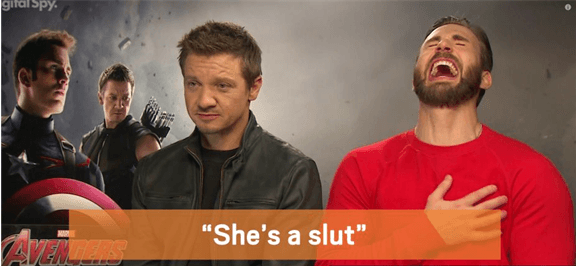“She’s a slut.” An eruption of laughter booms from Chris Evans after co-star Jeremy Renner lands his comment while keeping his deadpan expression. Based on Evans’ reaction it was probably impressive Renner was able to keep a straight face as the words rolled off his tongue. Renner, too, finally cracks and breaks into laughter as Captain America and Hawkeye go into full dudebro-Avengers:
Evans: [Laughter] I was going to say something along that line. Complete whore.
Renner: Trick, man.
Ignoring that Renner went throwback on some 90’s-era misogynistic rhetoric reminiscent of your uncle’s rolodex and bumping ‘Pac on your tape deck, optimistic fans offer benefit of the doubt that the two Avengers stars were using sarcasm, rendering their comments inoffensive. Others saw no victim to their actions, seeing that Black Widow is a fictional character. Whether you believe they were being sarcastic or not – I personally don’t – Renner and Evans’ comedy still fell short for many fans who didn’t find it very funny. For added context, this happened the same week that Disney marketed the release of 9 male Avengers toys, leaving out the only two women characters it had. Yet Jeremy Renner and Chis Evans continued laughing at their own jokes:
Evans: [Laughter] She’s a slut.
Renner: She has a prosthetic leg anyway.
While their comments, sarcastic or not, were aimed at the fictional Natasha Romanoff and not their real-life co-star Scarlett Johansson, it asks a question that reaches beyond a single character or movie: should opinions towards female characters be subject to the same scrutiny as real-life women and girls? To what extent are the standards by which we judge fictional characters different from real people? How much do our feelings towards fictional women characters inform our broader conceptions towards real-life women?
As often the case, you can find the worst answer to these questions in the comments section:
Certain types of fictional women are characterized with insults to their womanhood more than others. Across mediums, women characters that live outside perceived “feminine” gender norms but might fit well into the “masculine” end of the binary aren’t as often demeaned by audiences based on their sex – think Asha/Yara Greyjoy, or anyone with the last name Beifong. Other women characters, on the other hand, are viewed within a box of character constraints we expect from “femininity”. Placed outside that box are woman characters whose agency earns adoration in many instances, while characters inside are more likely to face scorn. To some, it would never matter how badass Black Widow is so long as her character is “feminine” enough to be placed in that box, and summarily be called a whore. For nonviolent women characters it’s often even worse.
Our attitudes about fictional women characters bring out a misogynistic judgment that is implicit in “real life,” namely that women are less worthy if they bear feminine traits, and laudable if they bear masculine ones. This shows a dichotomous and ultimately unfair attitude towards women in general.
How we talk about fictional characters is absolutely reflective of how we talk about real people
— Jamie McKelvie (@McKelvie) April 24, 2015
Personally, I’ve always loved Ashley Spinelli. The tough take-no-shit member Disney’s Recess, Spinelli was practically the muscle of the gang. Her anger was fierce, she stood up to 6th Graders, and she’d be a first-round draft pick if ever Battle Tag were made legal. Spinelli is the archetype of every woman character I loved – the “strong female character.” As a kid, “strength” looked aggressive. “Strength” looked quick-to-anger. “Strength” looked a lot like what I saw in men.
[quote_left]”Many hate women characters that fit inside gender norms, yet have agency to take actions outside their “feminine” expectations.”[/quote_left]At the opposite end of the spectrum is a character like Breaking Bad’s Skylar White. Skylar, similar to Walter White, made decisions in the name of her family, yet a significant number of viewers remarkably reviled her for it (so much so that actress Anna Gunn became hated herself, writing an Op-Ed of her experience portraying the character). The same could be said for The Shield’s Corrine Mackey – a character in a similar position who was actually quite reasonable given her circumstances, and was the most hated character on the drama. Meanwhile her husband was vile, corrupt, and an audience favorite.
Both women’s characters showed boldness outside of pulling weapons or crashing knuckles into faces, and both were called every name but the one their writer’s gave them. Many people simply hate women characters that appear to fit inside perceived gender norms and are non-violent, yet have agency to take actions outside their “feminine” expectations. While characters like Lazarus’ Forever Carlyle or Attack on Titan’s Mikasa don’t necessary fit the brash, aggressive woman archetype, [quote_right]”A misguidedly narrow view of womanhood combined with a misguidedly narrow view of strength”[/quote_right]they aren’t the type to hesitate in the face of a physical fight either, helping them avoid the summary judgment women characters often face. After all, they’d beat your ass “like a man” if it came down to it. Their characters are judged by different standards because they’re not particularly sexualized nor labeled “feminine”; as result, fans probably spend less time calling them sexually charged pejoratives and more time wondering who they could beat in a fight.
As with most entertainment, this doesn’t exist exclusive from reality. Skylar, Corrine, and countless other women characters are scrutinized by a view that stems from our real-life perceptions of women. A misguidedly narrow view of womanhood combined with a misguidedly narrow view of strength creates an unfair world of judgment for women who act outside those constraints. The result is misogynistic judgment that does not live in a vacuum with fictional female characters, but actually spills into them from our real-life erroneous perceptions of what it means when a woman acts with full agency.
Renner offered an apology after angry reactions rose from his comments: “I am sorry that this tasteless joke about a fictional character offended anyone. It was not meant to be serious in any way. Just poking fun during an exhausting and tedious press tour.”
While his excuse is less than flattering – don’t you hate when exhaustion makes you misogynistic? – what’s worse is any suggestion that misogynistic demeaning of a woman’s relationship choices [quote_left]”Hiding behind fictional characters doesn’t hide someone’s implicit misogynistic values”[/quote_left]are inoffensive when applied to fiction. To his credit, Chris Evans showed actual understanding in his own apology, saying, “Yesterday we were asked about the rumors that Black Widow wanted to be in a relationship with both Hawkeye and Captain America. We answered in a very juvenile and offensive way that rightfully angered some fans. I regret it and sincerely apologize.”
Hiding behind fictional characters doesn’t hide someone’s implicit misogynistic values, and those values need to be called out for what they are: unnecessary, damaging, and hurtful. Fictional characters are people we see ourselves in. Fictional characters reflect genuine aspects of manhood and womanhood. Fictional characters are relatable. Isn’t that why we love them?
Are you following Black Nerd Problems on Twitter, Facebook, Tumblr or Google+?







Show Comments
Victor
I spent a lot of my teens and early twenties in black activism. What I realized there is that you really have to choose your battles carefully because 1. You run the risk of drowning yourself out and 2.you become very easily baited for profit (more so now with pay for click sites and pay for like and comment posts). What was the probable harm? Was anyone’s mind changed by the he initial joke or apology for better or worse? This was click amd comment bait for cash.
As for the “fictional character”? I also collected comics as a teen and Black Widow would not be bothered by this. Why? She’s one of the few people that could convince you to kill yourself – without powers of any kind. She’s that cool.
chrisryanwrites
It seems to me there has been some ongoing mocking from the cast re how the media has been asking the female stars of this movie sexist questions. The cast seems to be goofing on it. Mark Ruffalo answered questions Scarlet is usually asked for Cosmopolitan (“Do you wear underwear under your costume?”). In a partially related development, Robert Downey Jr. walked out on another journalist who was dragging his “dark past” into questions supposedly related to the new movie. They are not bowing down to such demands. In this context, I suspect they were mocking expectations, poking fun at media sexism. I do not believe these people are fundamentally sexist.
matthewlane
“Black Widow is a ‘Whore’: Why You Deserve to be Judged by Your Opinions on Fictional Women”
No because that would be stupid on multiple fronts. Firstly Black Widow is not women, fictional or otherwise, she is simply a woman, in this case a fictional woman. So any slight against that character is a slight against that character.
An the second point would be an extension of that concept: If I choose to express dissatisfaction with an aspect of a fictional character then that is might right to do so. For instance if I call Thor a block headed moron or tony Stark and insufferable wanker there is no harm done as they are fictional characters. It was also be stupid to assume then that I think all men are block headed morons who are insufferable wankers.
So enough with the Hyperbole already.